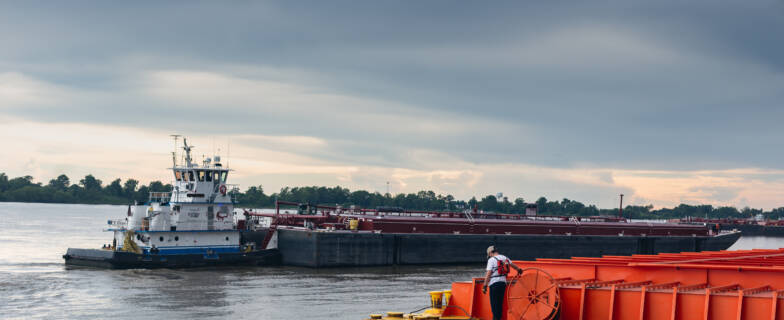$1.6M Settlement Reached Reached on Behalf of Deckhand Killed on the Ohio River
The United States Coast Guard (the “Coast Guard”) responded promptly, arriving to inspect the equipment/scene and interview witnesses. However, the Coast Guard would not complete its investigation or release any findings for almost two-and-a-half years. Consequently, Mr. Mink’s family retained admiralty attorney specialist Nelson G. Wolff of Schlichter Bogard & Denton to investigate on its behalf and to fight for compensation for Mr. Mink’s daughter. A civil action was filed in the United States District Court for the Eastern District of Kentucky, under the Jones Act and general maritime laws against C& B Marine, Inc. and Carmeuse Lime & Stone Mining Company (“Carmeuse”) for negligent failure to provide safe working conditions. (Estate of Christopher Mink, Cause No. 2:12-cv-51-DLB-CJS). C&B then filed a complaint in federal court under an ancient admiralty doctrine to exonerate itself from liability, claiming that it had no knowledge of unsafe working conditions or of its unseaworthy vessel. Alternatively, C & B sought to limit its liability to the $400,000 value of its towboat. The admiralty court issued a temporary restraining order that stopped the civil action for compensation brought by Mr. Mink’s family. SBD successfully fought this claim and obtained an order dissolving the restraining order so that the investigation could continue. A jury trial was set to begin July 14, 2014.
SBD took numerous depositions of company employees and officials, secured expert testimony, and reviewed thousands of pages of documents. The evidence demonstrated more than just an unfortunate “accident.” Rather, it showed corporate negligence at the management level. C&B knowingly assigned Mr. Mink to perform work that he had never done at this facility, with a shore based manager who was filling in as a relief pilot on a job with which he was unfamiliar. The towboat mate was experienced at this job but failed to properly instruct and supervise Mr. Mink, or advise the mine that the crew was inexperienced. C&B admitted to hooking the cable to an improper location on the cover, which created a pinch point that would have been avoided had the cable been connected to the center of the cover. Its radio procedures allowed miscommunication with the Carmeuse winch operator, who admitted to tightening the cable when Mr. Mink was still attempting to release it. She reported that she did this in response to the mate’s radioing her to do so. The mate denied this specific order, but acknowledged that he did have radio communication with the mine employee right before the incident. Investigation also revealed that the towboat was defective. One engine was broken, which explained why it attempted to face the barge from an upriver position, contrary to safe maritime practice. This positioning increased the potential for bumping the barge and suddenly tightening the cable while Mr. Mink was attempting to disconnect it. Moreover, the mate failed to secure the cable to the center padeye of the cover, which would have eliminated the pinch point. He contended that the cable was tangled and could not be extended past the dagger pin box at the corner of the cover. Time considerations for this Saturday overtime work may explain why the mate did not simply unwind the cable and secure it to the proper location or to warn Mr. Mink that it was defective. The loss of situational awareness of the C&B crew could also most logically be explained by management’s decision to work the crew for over sixty hours during that week.
Schlichter Bogard & Denton’s investigation identified additional evidence that Carmeuse failed to adequately train and supervise its load out operator, who was working without supervision for the very first time, reportedly because her supervisor was out Christmas shopping. Carmeuse admitted that the cable should not have been tightened while Mr. Mink was still attempting to disconnect it from the barge cover, yet it failed to implement adequate safety procedures to assure that towboat crew members were protected from equivalent incidents.
After Schlichter Bogard & Denton’s investigation had been completed, the Coast Guard finally released its final report, finding that C&B and Carmeuse failed to provide adequate communication systems for this work. It also concluded that these companies “failed to identify the highest risks and develop strategies, written procedures and protocols to minimize [injury] risks.” Although the report also concluded that the deckhand lost situational awareness and placed himself in an unsafe position, he had minimal experience working at the Carmeuse site and was put into a work situation with other inexperienced workers, creating the need for more communication and supervision than what was provided.
The federal maritime and Jones Act laws limit compensation in death cases to the value of pain experienced by the worker before death and the amount of financial support he would have provided to his child. Here, one medical expert estimated the period of pain and suffering to be about 15 seconds, significantly limiting the amount of compensation available. As to the financial support component, Mr. Mink was paying child support in the sum of about $350/month or less than $5,000/year. An economist estimated that the highest amount of contributions payable until the child became an adult totaled about $300,000. All damages must be reduced, under federal law, by the percentage of fault of the deceased worker.
About one month after an unsuccessful mediation, as the trial date neared, defendants finally agreed to pay $1.6 million to settle the case out of court. Although no amount can ever fully compensate for the loss of a loving father, as Mr. Mink undoubtedly proved to be, this sum will provide financial security for Mr. Mink’s daughter and enable her to have the college education he wanted for her. We are grateful to have been able to discover the truth and successfully resolve the case for this family. We believe that they will now be better able to find peace from the unnecessary loss of Mr. Christopher Mink. We are less optimistic about the Coast Guard recognizing the legitimate need for more prompt reporting on these significant incidents and tremendously disappointed that it failed to impose financial penalties on either company responsible for this death. Such a posture sadly reinforces the corporate notion that employee injuries and deaths are merely a cost of doing business in an industry that too often places profits over safety.
Visit our website to read about other high-impact cases handled by Schlichter Bogard & Denton. For additional information about Schlichter Bogard and Denton’s Personal and Maritime Injury Practice, please contact us at 800-873-5297 or contact@uselaws.com.



